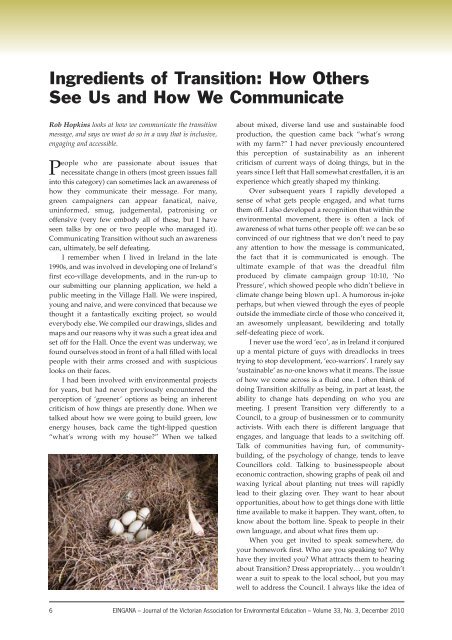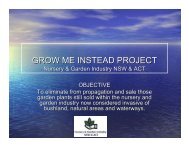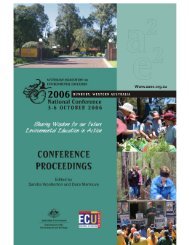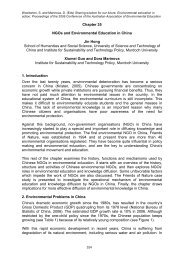Eingana - Australian Association for Environmental Education
Eingana - Australian Association for Environmental Education
Eingana - Australian Association for Environmental Education
Create successful ePaper yourself
Turn your PDF publications into a flip-book with our unique Google optimized e-Paper software.
Ingredients of Transition: How Others<br />
See Us and How We Communicate<br />
Rob Hopkins looks at how we communicate the transition<br />
message, and says we must do so in a way that is inclusive,<br />
engaging and accessible.<br />
People who are passionate about issues that<br />
necessitate change in others (most green issues fall<br />
into this category) can sometimes lack an awareness of<br />
how they communicate their message. For many,<br />
green campaigners can appear fanatical, naive,<br />
unin<strong>for</strong>med, smug, judgemental, patronising or<br />
offensive (very few embody all of these, but I have<br />
seen talks by one or two people who managed it).<br />
Communicating Transition without such an awareness<br />
can, ultimately, be self defeating.<br />
I remember when I lived in Ireland in the late<br />
1990s, and was involved in developing one of Ireland’s<br />
first eco-village developments, and in the run-up to<br />
our submitting our planning application, we held a<br />
public meeting in the Village Hall. We were inspired,<br />
young and naive, and were convinced that because we<br />
thought it a fantastically exciting project, so would<br />
everybody else. We compiled our drawings, slides and<br />
maps and our reasons why it was such a great idea and<br />
set off <strong>for</strong> the Hall. Once the event was underway, we<br />
found ourselves stood in front of a hall filled with local<br />
people with their arms crossed and with suspicious<br />
looks on their faces.<br />
I had been involved with environmental projects<br />
<strong>for</strong> years, but had never previously encountered the<br />
perception of ‘greener’ options as being an inherent<br />
criticism of how things are presently done. When we<br />
talked about how we were going to build green, low<br />
energy houses, back came the tight-lipped question<br />
“what’s wrong with my house?” When we talked<br />
6<br />
about mixed, diverse land use and sustainable food<br />
production, the question came back “what’s wrong<br />
with my farm?” I had never previously encountered<br />
this perception of sustainability as an inherent<br />
criticism of current ways of doing things, but in the<br />
years since I left that Hall somewhat crestfallen, it is an<br />
experience which greatly shaped my thinking.<br />
Over subsequent years I rapidly developed a<br />
sense of what gets people engaged, and what turns<br />
them off. I also developed a recognition that within the<br />
environmental movement, there is often a lack of<br />
awareness of what turns other people off: we can be so<br />
convinced of our rightness that we don’t need to pay<br />
any attention to how the message is communicated,<br />
the fact that it is communicated is enough. The<br />
ultimate example of that was the dreadful film<br />
produced by climate campaign group 10:10, ‘No<br />
Pressure’, which showed people who didn’t believe in<br />
climate change being blown up1. A humorous in-joke<br />
perhaps, but when viewed through the eyes of people<br />
outside the immediate circle of those who conceived it,<br />
an awesomely unpleasant, bewildering and totally<br />
self-defeating piece of work.<br />
I never use the word ‘eco’, as in Ireland it conjured<br />
up a mental picture of guys with dreadlocks in trees<br />
trying to stop development, ‘eco-warriors’. I rarely say<br />
‘sustainable’ as no-one knows what it means. The issue<br />
of how we come across is a fluid one. I often think of<br />
doing Transition skilfully as being, in part at least, the<br />
ability to change hats depending on who you are<br />
meeting. I present Transition very differently to a<br />
Council, to a group of businessmen or to community<br />
activists. With each there is different language that<br />
engages, and language that leads to a switching off.<br />
Talk of communities having fun, of communitybuilding,<br />
of the psychology of change, tends to leave<br />
Councillors cold. Talking to businesspeople about<br />
economic contraction, showing graphs of peak oil and<br />
waxing lyrical about planting nut trees will rapidly<br />
lead to their glazing over. They want to hear about<br />
opportunities, about how to get things done with little<br />
time available to make it happen. They want, often, to<br />
know about the bottom line. Speak to people in their<br />
own language, and about what fires them up.<br />
When you get invited to speak somewhere, do<br />
your homework first. Who are you speaking to? Why<br />
have they invited you? What attracts them to hearing<br />
about Transition? Dress appropriately… you wouldn’t<br />
wear a suit to speak to the local school, but you may<br />
well to address the Council. I always like the idea of<br />
EINGANA – Journal of the Victorian <strong>Association</strong> <strong>for</strong> <strong>Environmental</strong> <strong>Education</strong> – Volume 33, No. 3, December 2010








